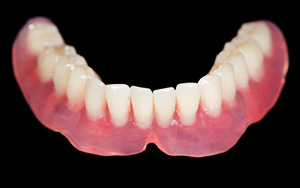
It’s easy to assume that lower dentures would have an easier time staying in place in your mouth than upper dentures, but in many cases, it’s just the opposite. Quite a few people complain about lower dentures that are too loose and have a tendency to shift or slip a lot. What exactly is the root of the problem? Here is some insight from your dentist regarding why lower dentures often have difficulty staying put – and what you can do to solve the issue.
Why Won’t Your Lower Dentures Stay in Place?
There are several reasons why lower dentures tend to be less stable than upper ones:
- There Might Not Be Enough Bone in Your Jaw: The lower dentures rest on the jawbone. However, if it has been a while since you lost your natural teeth, much of the bone in the jaw may have been resorbed. The result is a ridge that lacks the height and width needed to properly support dentures.
- Lower Dentures Sit on a Narrow Surface Area: Upper dentures are usually designed to cover the upper palate, giving them a relatively large area to adhere to via natural suction. Lower dentures don’t have that advantage; the ridge that supports them is very narrow.
- You May Simply Not Be Used to Them Yet: It can be all too easy to dislodge your lower dentures unintentionally with your tongue. Also, since your lower dentures don’t function exactly like natural teeth, you need to change the way you chew your food. It’s not uncommon for lower dentures to shift a lot while you’re still adjusting to them.
How Can You Help Your Lower Dentures Stay in Position?
If you’re having trouble keeping your lower dentures in their proper place, there are a few strategies you can try:
- Give yourself plenty of practice speaking and chewing with your lower dentures. This will help speed up the adjustment process so that your mouth can make the appropriate accommodations for the prosthesis.
- Utilize a denture adhesive if you need to. You don’t need to use a lot – just three dots are more than enough in many cases.
- Have your dentist check the fit of your dentures. Sometimes they might be able to solve the issue with a reline.
- Consider getting dental implants. Your dentures won’t be in danger of slipping anymore once they have been attached to sturdy implant posts.
You need a full set of teeth you can rely on if you want to enjoy life to the fullest, so it’s important to take whatever steps you need to in order to make sure that your lower dentures don’t move when you don’t want them to.
About the Author
Dr. Evan Pedersen earned his dental degree at the Harvard School of Dental Medicine in Boston. At Oris Dental Studio in Austin, he offers a sophisticated approach to dental care that takes advantage of the latest techniques and technologies. In cases where multiple teeth are missing, he may recommend comfortable, natural-looking dentures. To schedule a consultation with Dr. Pedersen, visit his website or call (512) 777-0866.
